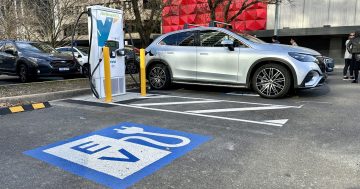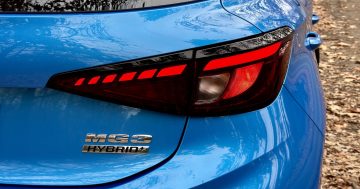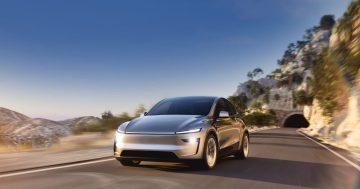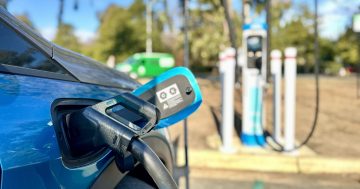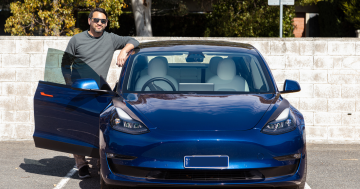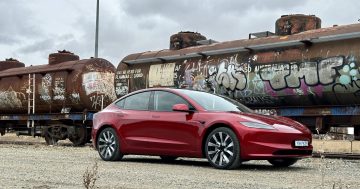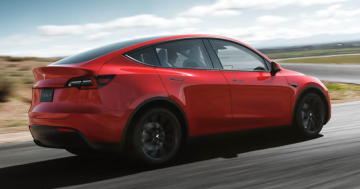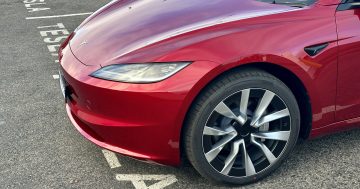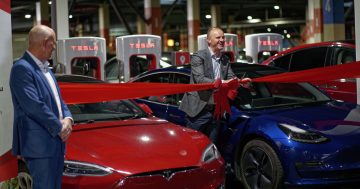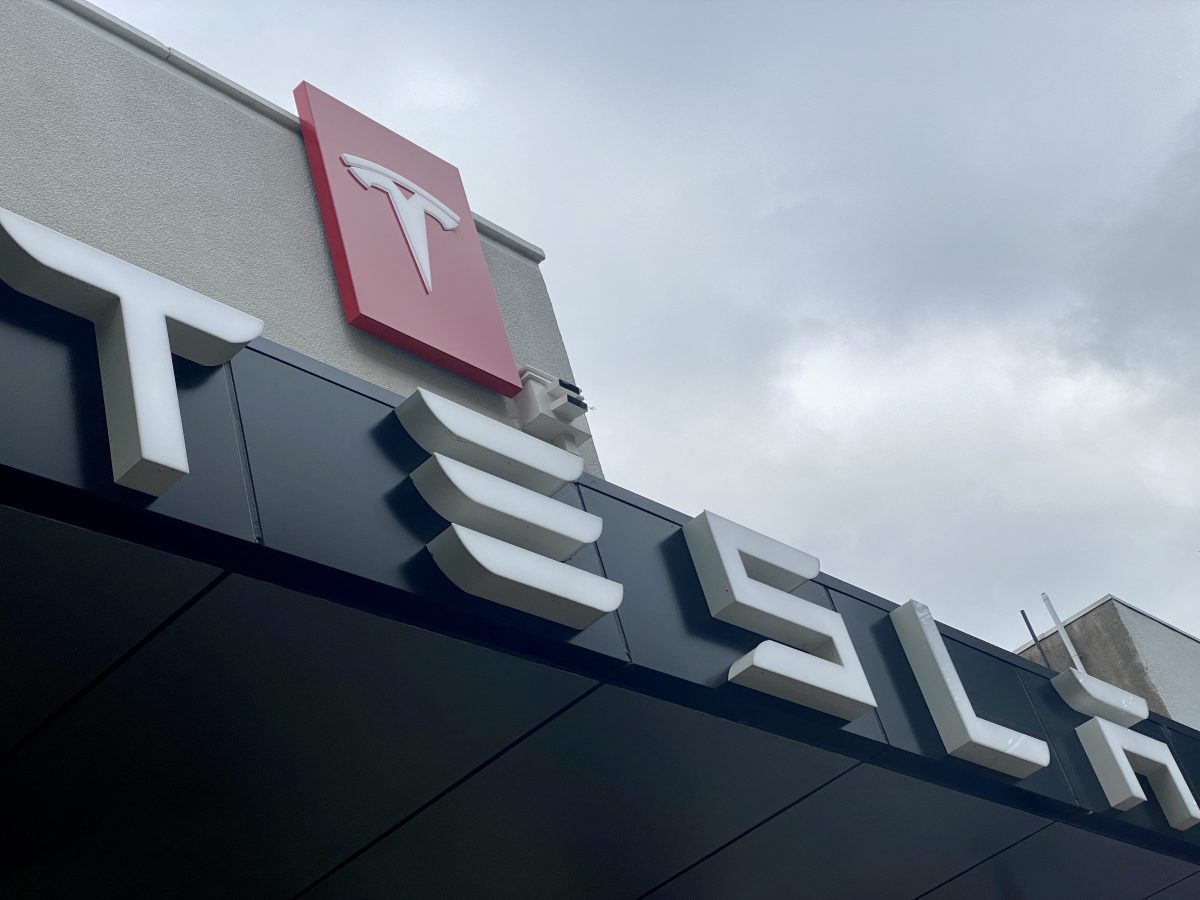
The Tesla Canberra store on Bunda Street. Photo: James Coleman.
Canberra’s best-selling EVs are now $3000 less to buy brand-new than they were last week.
It comes after Tesla reported its worst quarter since 2021 – a 9 per cent drop in revenue from January to March.
Global vehicle deliveries also fell over the same period for the first time in four years, and founder Elon Musk has flagged plans to lay off more than 10 per cent of the global workforce as he braces for the first annual drop in deliveries.
Shares have taken a tumble, too – they’re down 40.8 per cent since the beginning of 2024.
What does this mean?
The result is price cuts across the Tesla range. The US was first, followed by the other major markets like China and Germany, and as of 23 April, Australia too.
The Model 3 sedan is down $3000 and now retails from $58,900 – the cheapest it’s been since July 2023 when the previous model fetched $57,400.
It’s the second change in less than a month for the Long Range AWD version as well, which was only just cut from $71,900 to $70,900 on 4 April.
The original Model 3 launched in Australia in July 2019, costing $66,000 for the RWD and $87,842 for the AWD.
The Model Y SUV has also dropped by $3000 and retails from $60,900. This makes it $8000 cheaper than 12 months ago and $11,400 less than 18 months ago.
Orders opened for the Model Y in June 2022, when it cost $68,900.
What’s causing it?
Demand for Teslas has waned in the US and EU as a flood of Chinese models heats up the competition, chiefly from BYD and MG. These markets are also moving past the early-adopter phase when most people who can afford an EV already have one.
Musk tweeted late last month that “Tesla prices must change frequently in order to match production with demand”.
But Australia hasn’t been hit by this same shift yet.
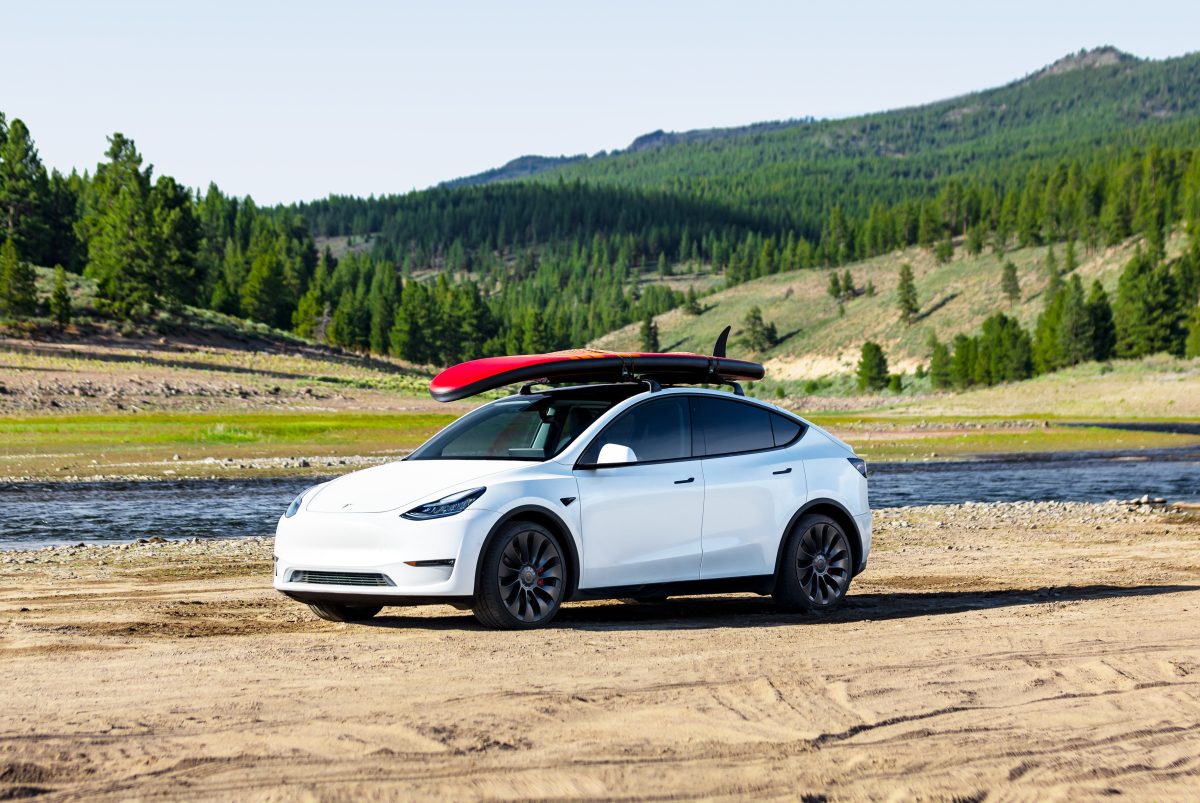
Tesla sold 1041 Model Ys in the ACT last year. Photo: Tesla Australia.
Between January and March this year, 46.4 per cent more EVs were registered across the country than in the first quarter of 2023.
Tesla enjoyed a 23 per cent uptick in deliveries over the same period, and the Model Y and Model 3 took up 12,789 sales – or just over half the number of all new battery-powered vehicle sales in Australia.
Third place went to the BYD Atto 3 (2220 sales), followed by its sedan sibling, the BYD Seal (1573). The MG4, appropriately perhaps, took fourth place (1335).
Closer to home, Tesla sold nearly 2000 new cars in Canberra last year – 1041 Model Ys and 761 Model 3s – making it our second favourite brand after Toyota. This figure compares to a total of 725 cars in 2022.
The Australian Automotive Dealer Association (AADA), based in Barton, says this is because Australia was “a bit later” to the EV party.
“Unlike other countries, we have only recently started incentivising and encouraging EV uptake,” CEO James Voortman says.
“I think Australia is still in the ‘early adopter’ phase of EV uptake, which explains the current higher rate of growth relative to markets like the EU.”
What does it mean for used EVs?
As for what happens next, it’s tricky.
“Significant price reductions by manufacturers like Tesla are a major factor driving depreciation of EVs,” Mr Voortman says.
“New car price cuts directly affect used car values.”
This depreciation may mean more people are able to afford used Teslas, but it could also put people off.
How does depreciation for EVs compare to other cars?
EVs lose value much faster than petrol, diesel or hybrid cars.
Data from a December 2023 AutoGrab report shows EVs up to two years old retain 82.8 per cent of their value, compared with 95.5 per cent of all other vehicle types. EVs only keep 57.6 per cent of their value between two and four years and 24.1 between five and seven years.
Other vehicle types retain 85.9 and 68.8 per cent of their value over the same respective time periods.

Fear over battery health is the greatest put-off for buyers of second-hand EVs. Photo: ACT Government.
Will this improve?
Mr Voortman says concern over battery life is the biggest reason for the gap in value.
“The older the battery, the closer it will be to losing its manufacturer warranty and the greater the consumer’s fear that they could be stuck with a battery that does not hold its charge or, worse, requires replacement.”
However, most car manufacturers guarantee their batteries for longer periods than the standard car warranty.
Tesla, for instance, covers the battery in the Model 3 RWD for eight years or 160,000 km, whichever comes first, with a minimum 70 per cent battery capacity retention over the warranty period. Cover for the Long Range and Performance models is eight years or 192,000 km.
Mr Voortman expects residuals for EVs to improve as the “technology gets better and consumer education improves”.












